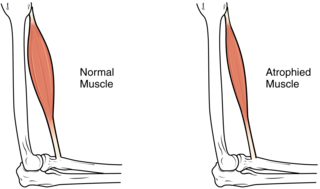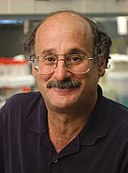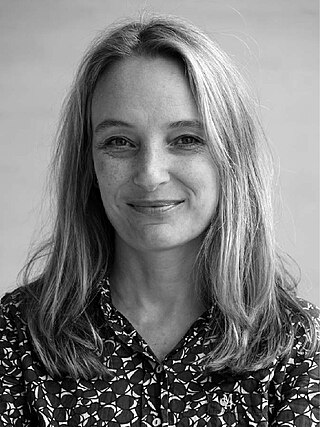Related Research Articles
Molecular biology is a branch of biology that seeks to understand the molecular basis of biological activity in and between cells, including biomolecular synthesis, modification, mechanisms, and interactions.

Bruce Nathan Ames was an American biochemist who was a professor of biochemistry and Molecular Biology Emeritus at the University of California, Berkeley, and was a senior scientist at Children's Hospital Oakland Research Institute (CHORI). Ames made contributions to understanding the mechanisms of mutagenesis and DNA repair. He invented the Ames test, a widely used assay for easily and cheaply evaluating the mutagenicity of compounds. The test revolutionized the field of toxicology and has played a crucial role in identifying numerous environmental and industrial carcinogens.

Hartmut Michel is a German biochemist, who received the 1988 Nobel Prize in Chemistry for determination of the first crystal structure of an integral membrane protein, a membrane-bound complex of proteins and co-factors that is essential to photosynthesis.

Peter Walter is a German-American molecular biologist and biochemist. He is currently the Director of the Bay Area Institute of Science at Altos Labs and an emeritus professor at the Department of Biochemistry and Biophysics of the University of California, San Francisco (UCSF). He was a Howard Hughes Medical Institute (HHMI) Investigator until 2022.

Muscle atrophy is the loss of skeletal muscle mass. It can be caused by immobility, aging, malnutrition, medications, or a wide range of injuries or diseases that impact the musculoskeletal or nervous system. Muscle atrophy leads to muscle weakness and causes disability.

Irwin Fridovich was an American biochemist who, together with his graduate student Joe M. McCord, discovered the enzymatic activity of copper-zinc superoxide dismutase (SOD),—to protect organisms from the toxic effects of superoxide free radicals formed as a byproduct of normal oxygen metabolism. Subsequently, Fridovich's research group also discovered the manganese-containing and the iron-containing SODs from Escherichia coli and the mitochondrial MnSOD (SOD2), now known to be an essential protein in mammals. He spent the rest of his career studying the biochemical mechanisms of SOD and of biological superoxide toxicity, using bacteria as model systems. Fridovich was also Professor Emeritus of Biochemistry at Duke University.

Tumor necrosis factor receptor superfamily member 12A also known as the TWEAK receptor (TWEAKR) is a protein that in humans is encoded by the TNFRSF12A gene.
Franz-Ulrich Hartl is a German biochemist and the current Executive Director of the Max Planck Institute of Biochemistry. He is known for his pioneering work in chaperone-mediated protein folding.
Steven G. Clarke, an American biochemist, is a director of the UCLA Molecular Biology Institute, a professor of chemistry and biochemistry at UCLA biochemistry department. Clarke heads a laboratory at UCLA's department of chemistry and biochemistry. Clarke is famous for his work on molecular damage and discoveries of novel molecular repair mechanisms.
Charles Tanford was a German-born protein biochemist. He died in York, England, on October 1, 2009.

The La Trobe Institute for Molecular Science (LIMS) is an Australian institute based at La Trobe University in Melbourne. It contains research groups in life sciences, physical sciences, and applied sciences (pharmacy) and teaches undergraduate and graduate courses in these areas through the School of Molecular Sciences. Established in 2009, the institute has been led by Professor Andrew Hill since 2017.
Zeng Rong is a Chinese biochemist researching and developing technology for proteomics research. She is currently a professor at the Institute of Biochemistry and Cell Biology at the Shanghai Institutes for Biological Sciences.
The mitochondrial unfolded protein response (UPRmt) is a cellular stress response related to the mitochondria. The UPRmt results from unfolded or misfolded proteins in mitochondria beyond the capacity of chaperone proteins to handle them. The UPRmt can occur either in the mitochondrial matrix or in the mitochondrial inner membrane. In the UPRmt, the mitochondrion will either upregulate chaperone proteins or invoke proteases to degrade proteins that fail to fold properly. UPRmt causes the sirtuin SIRT3 to activate antioxidant enzymes and mitophagy.

Tracy Palmer is a British microbiologist who is a professor of microbiology in the Biosciences Institute at Newcastle University in Tyne & Wear, England. She is known for her work on the twin-arginine translocation (Tat) pathway.
Sylvy Kornberg née Sylvia Ruth Levy (1917–1986) was an American biochemist who carried out research on DNA replication and polyphosphate synthesis. She discovered and characterized polyphosphate kinase (PPK), an enzyme that helps build long chains of phosphate groups called polyphosphate (PolyP) that play a variety of metabolic and regulatory functions. She worked closely with her husband and research partner, Arthur Kornberg, contributing greatly to the characterization of DNA polymerization that earned him the 1959 Nobel Prize in Physiology or Medicine.

Alan Lambowitz is a professor for the University of Texas at Austin in Molecular Biosciences and Oncology and has been instrumental in many bio-molecular processes and concepts, such as intron splicing and mitochondrial ribosomal assembly.

Eilika Weber-Ban is a German biochemist. Her research considers protein degradation pathways. She was elected to the European Molecular Biology Organization in 2021.

Bruce Arthur Stone AM was an Australian biochemist and the foundation Professor of Biochemistry at La Trobe University.
Lars Gerhard Ljungdahl (1926-2023) was a Swedish biochemist, famous for his part in the discovery of the major carbon fixation in the form of the Wood-Ljungdahl pathway as well as lignocellulose degradation by bacteria and fungi. He died in July 2023 at age 96.
References
- ↑ "Queen's Birthday honours: full list". The Sydney Morning Herald. 8 June 2014. Retrieved 6 January 2024.
- ↑ "Nick Hoogenrad". La Trobe University. Archived from the original on 18 November 2023. Retrieved 6 January 2024.
- ↑ Multiple sources:
- Vögtle, F.-Nora; Meisinger, Chris (2012). "Sensing Mitochondrial Homeostasis: the Protein Import Machinery Takes Control". Developmental Cell . 23 (2): 234–236. doi: 10.1016/j.devcel.2012.07.018 . PMID 22898772.
- Sugiura, Ayumu; McLelland, Gian-Luca; Fon, Edward A; McBride, Heidi M (2014). "A New Pathway for Mitochondrial Quality Control: Mitochondrial-derived Vesicles". The EMBO Journal . 33 (19): 2142–2156. doi: 10.15252/embj.201488104 . ISSN 0261-4189. PMC 4282503 . PMID 25107473.
- Weissig, Volkmar; Edeas, Marvin (2022). "Recent developments in mitochondrial medicine (part 2): Aging, longevity and microbiota". 4open. 5: 5. doi: 10.1051/fopen/2022002 . ISSN 2557-0250.
- Hoogenraad, Nick (2017). "A Brief History of the Discovery of the Mitochondrial Unfolded Protein Response in Mammalian Cells" . Journal of Bioenergetics and Biomembranes. 49 (4): 293–295. doi:10.1007/s10863-017-9703-2. ISSN 0145-479X. PMID 28429159. S2CID 207186696.
- ↑ "Lique Hoogenraad Obituary". The Age. 22 July 2013.
- 1 2 3 "Professor Nick Hoogenraad, biochemist | Australian Academy of Science". www.science.org.au. Retrieved 8 January 2024.
- 1 2 Hoogenraad, Nick (2017). Biochemistry at La Trobe University: A Proud History (PDF). Bundoora: La Trobe University.
- ↑ University, La Trobe. "Ten years of world-class research". www.latrobe.edu.au. Retrieved 8 January 2024.
- ↑ "Programme 2024 - SCWD". 30 November 2021. Retrieved 17 January 2024.
- ↑ "How to stop cancer patients wasting away". cosmosmagazine.com. 28 September 2015. Retrieved 5 February 2024.